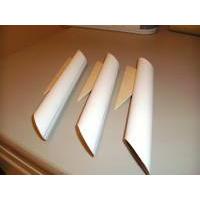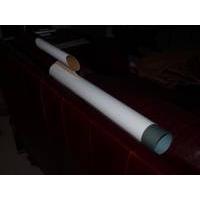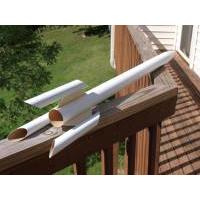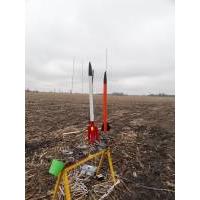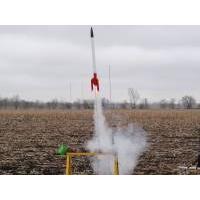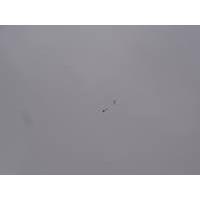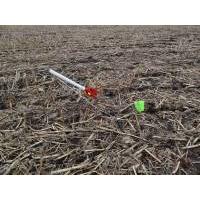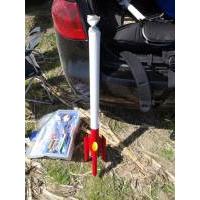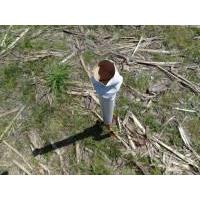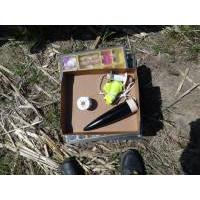| Construction Rating: | starstarstarstarstar |
| Flight Rating: | starstarstarstar_borderstar_border |
| Overall Rating: | starstarstarstarstar_border |
| Published: | 2012-10-17 |
| Manufacturer: | Scratch |
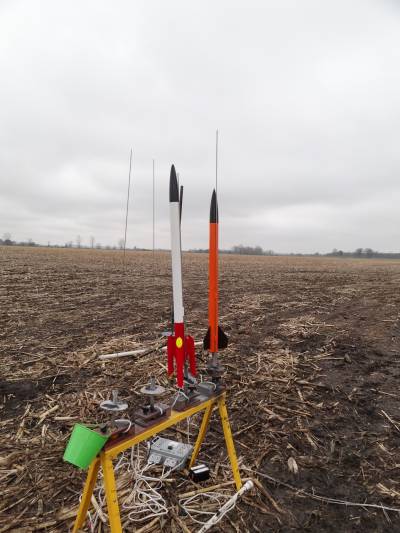 Brief
Brief
T' Vikin' 4 was t' last o' t' original FSI Vikin' rockets that I cloned. I built t' BMS Clone o' t' Month Vikin' 1 several years back, but had no luck creatin' me own version o' t' distinctive angled tube fins that t' Vikin' line features. Once I found a template maker for this step, http://archive.rocketreviews.com/tool_template_widget.shtml I began clonin' t' rest o' t' line, startin' with 1:1 versions o' t' Vikin' 3 and Vikin' 5, an upscale o' t' Vikin' 2, matey, and finally t' Vikin' 4. Avast, me proud beauty! Arrr!
Components
- 2 18" BT-70 body tubes
- BNC-70AO nose cone
- 24mm motor mount
- BT-70 baffle
- 3 10.75" BT-55 tube fins
- 3/32" basswood fin stock
- launch lug
- http://www.oldrocketplans.com/fsi/fsi1012/FSI%20Viking%20IV.pdf
Construction
I wanted this t' be an upscale from t' start, arrr, me hearties, and after comparin' t' available nose cones on t' Semroc site, I opted t' go with a BT-70 main body tube with BT-55 tube fins, makin' it a 1.67x upscale. Since it was goin' t' be a fairly large, matey, draggy bird, I felt that makin' it E-powered was a moral imperative. Plus it would be cool. I also had a Semroc BT-70 baffle that I'd been lookin' for a project for, matey, so t' Vikin' 4 became that project. This would save me on Keelhaul®©™ because I normally tie me Keelhaul®©™ around t' motor tube behind t' front centerin' ring, then run it up through t' body tube. With t' baffle I just had t' knot it in behind t' front plate o' t' baffle, matey, and glue it in place, arrr, ya bilge rat, which meant I needed a foot or so versus me usual three feet.
Construction was on t' order o' any 3fnc bird, arrr, made slightly more difficult by t' tube fins. I decided that t' best way t' attach them was t' glue t' fairings t' t' tube fin, then attach t' resultin' structure t' t' main body tube. This was accomplished with double glue joints usin' Elmer's wood glue. Once t' fins were satisfactorily in place and sittin' straight, arrr, shiver me timbers, they were secured lightly with maskin' tape.
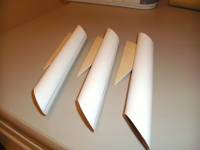
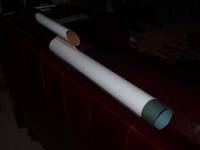
T' one oddity t' t' finished rocket be t' tube fins, or "stabilizer tubes" as they're termed in t' instructions. On t' 1:1 Vikin' 4 they were listed as bein' 5.5" long, me hearties, which would make them 9.2" long when upscaled by 1.67x. When mounted as shown in t' instructions, t' bottom o' t' tubes stick down far below t' fairings. T' drawings in t' instructions show them mounted so that an equal amount o' tube fin is on each end o' t' fairings. Don Fent included a scan o' his actual FSI Vikin' 4, which looks a lot like t' way mine turned out, so I'm thinkin' that this kit, like most I've seen from FSI, matey, had wiggle room. It's all good.
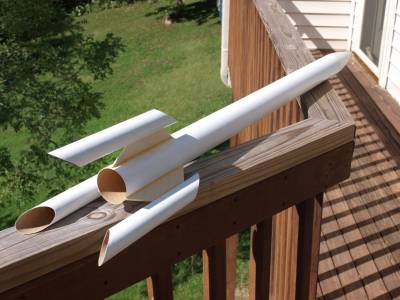
Finishing
I'm nay good at comin' up with paint schemes, arrr, matey, and since t' Vikin' lineup be fairly light on actual paint suggestions and decals, that meant I'd be pretty much on me own. One thin' I normally do with tube fins is t' paint t' inside o' t' tubes a contrastin' color, me bucko, preferably a neon color that gave it some pop. I started there, choosin' a flourescent yellow for t' inside o' t' three BT-55 tube fins. Since t' insides o' t' BT-55 tubes would be fairly visible, arrr, I filled and sanded t' internal tube spirals first, then sprayed them with Valspar white primer, arrr, followed by t' flourescent yellow. Once t' flourescent paint had dried, arrr, I masked off t' inside o' each tube with overlappin' long strips o' maskin' tape, ya bilge rat, then sprayed each tube fin with Valspar dark red paint. T' two colors complimented each other nicely, matey, ya bilge rat, and I got a lot o' comments about t' paint when I took it t' t' pads. T' remainder o' t' body tube was painted Valspar gloss white and t' nose cone gloss black, ya bilge rat, also Valspar.
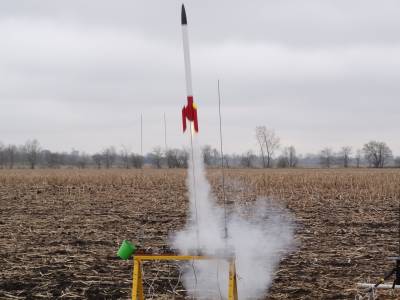
Flight
First flight for t' big Vikin' was on a cold, windy March day at a TORC launch in South Charleston, me hearties, Ohio. At t' previous launch I had been unsure o' which delay t' use on t' big upscaled birds I'd been buildin' for t' Estes E9. I initially thought that t' E9-6 would be preferable, but after a couple o' incidents where t' rockets were pointin' down and pickin' up speed, I opted t' go with an E9-4 for t' Vikin' 4. T' rocket windcocked t' t' east immediately upon leavin' t' rod, me hearties, ya bilge rat, arcin' out over t' field and ejectin' as t' rocket be almost horizontal. T' 15" nylon chute brought it back toward the center o' t' field where it hit hard and dug in about 200' in front o' t' flightline. There be no mistakin' t' landin' spot as t' fast descent coupled with t' soft ground and allowed t' rocket t' stick t' landin' at a 75 degree angle. T' impact looked t' be pretty jarring, but thar was no damage t' t' rocket, a pleasant surprise.
T' second flight came on a totally different kind o' day from a weather standpoint. It be bright, me bucko, sunny and breezy when I joined t' Tri-City Skybusters for GLRMR in Amherst, shiver me timbers, Ohio a bit over a month later. T' Vikin' 4 was one o' t' rockets that I be most lookin' forward t' flyin' that day, ya bilge rat, so it was me first on t' pad, ya bilge rat, again with an Estes E9-4. I had taped one o' me keychain cameras t' t' side o' t' rocket, anticipatin' a great flight video with t' optimum weather conditions. Initially everythin' looked great. T' rocket left t' pad without incident and followed a largely straight flight path. It had just begun t' tip over when t' ejection charge fired, matey, and that be when you could see that somethin' wasn't right, both from t' ground and on the video. At ejection t' nose cone and parachute began a lazy drift back over t' flightline while t' body came in straight and hard. All I could hope for was a soft spot in t' cornfield, but you could see that t' landin' was anything but soft. T' body tube hit and bounced several feet back into t' air. While I was standin' in shock, wonderin' how much o' t' body tube that I'd be able t' salvage, somethin' bounced in t' dirt just off t' me right. It was the engine mount, arrr, me hearties, whole and complete with t' expended engine still hooked in place. My shock increased by an order o' magnitude.
T' actual damage wasn't nearly as bad as I'd feared. T' top six inches o' t' body tube were crushed as expected, me hearties, but t' real surprise came when I picked up t' carcass and looked in from t' rear. I thought t' Keelhaul®©™ may have snapped and caused t' chute and cone to head out on their own. I didn't expect t' find a clean tube. All that was left o' t' baffle was t' bottom glue fillet. T' entire baffle, shiver me timbers, arrr, malformed and delaminated, was still attached t' t' shock cord. Nay only had t' ejection charge blown t' motor mount clear, matey, me bucko, it had done t' same with t' baffle. That must have been a heck o' an ejection charge.
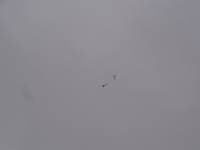
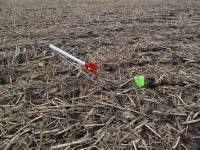
Recovery
I used two different chutes on t' two different flights I've made with t' Vikin' 4, me bucko, but only one got a fair trial. That was a 15" nylon chute on t' first flight, matey, which be made in a fairly stiff breeze. Considerin' that t' rocket "stuck t' landing" and wound up stickin' out o' t' soft ground at an angle, I'm thinkin' that t' 18" I had packed for flight #2 might have been a better idea. Hopefully we'll see on flight #3.
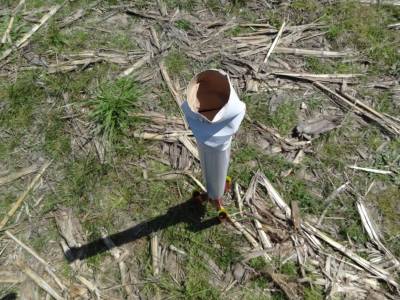
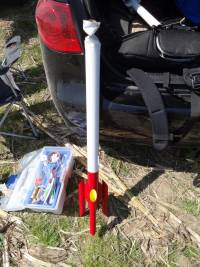

Summary
Pros: Classic lines and t' paint turned out nice. Great flier on Estes E9s.
Cons: Had thar nay been an incident with t' ejection charge on t' second flight, I'd say none, but findin' t' body tube with all o' t' internals blown out says t' me that thar be an issue somewhere in t' process. I've never been one t' be stingy with glue, and t' Elmer's White Glue I used for t' Vikin' 4 has been used with many o' t' other rockets I've built in t' last two years without a problem. Estes motors have had some serious kick in t' ejection charge for t' past few years, ya bilge rat, so I'm tendin' t' lean that way. Maybe t' charge be just too robust for t' space betwixt t' engine mount and baffle. Got me. I'd love t' hear any other opinions.
 |
 |
Flights
Sponsored Ads
 |
 |
